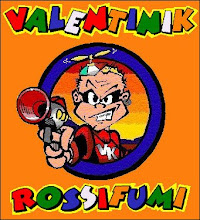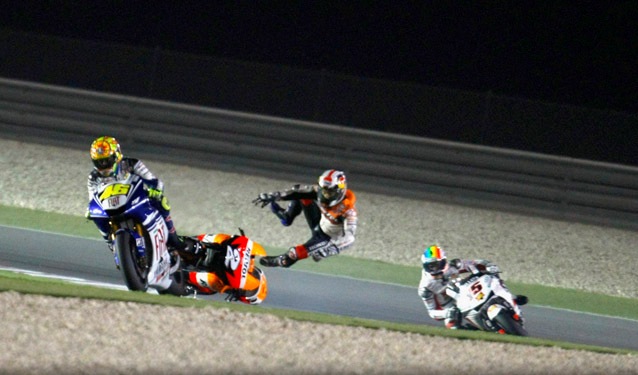
There was much speculation during the second half of the 2003 season about Rossi's plans for the future. Most suspected that he would succeed in his bid to claim a third consecutive title and wondered where the amazingly talented Italian would go in the future. His contract with Honda was up at the end of the year and there were rumours that Rossi had become somewhat disillusioned with his ride at Honda. His tenure at Honda had effectively run its course; he had provided Honda with a 500 cc World Championship as well as consecutive MotoGP World Championships, he had helped perfect the RC211V into a formidable, almost unstoppable racing machine and considering Honda's reluctance to pay top dollar to secure his services in 2004, seemed to have overstayed his welcome.

Partnered with increased scepticism that the reason for his success was the dominance of the RC211V rather than Rossi's talent, it was inevitable that Honda and Rossi would part. Mid-season rumours pointed towards a possible move to Ducati, which sent the Italian press into frenzy; the concept of the great Italian on the great Italian bike seemed too good to be true. Ducati did indeed try to seduce Rossi into riding their MotoGP bike, the Desmosedici, but for numerous reasons Rossi passed the offer up. Critics say that compared to the other manufacturers, Ducati had a significant way to go before being competitive even with Rossi at the helm. This proved to be the truth with Ducati's lacklustre performance in the 2004 season, which had actually been worse than their inaugural year in MotoGP in 2003.
Ultimately, Rossi signed a two-year contract with rivals Yamaha reportedly worth in excess of (U.S) $12 million; a price no other manufacturer, even Honda, was willing to pay.Rossi's move to Yamaha would be a baptism of fire. His fiercest critics claimed that on an inferior machine (the Yamaha YZR-M1), Rossi would not be able to recreate his World Championship wins of the previous years, especially with increased development of the RC211V and the likes of Max Biaggi and Sete Gibernau on Hondas. The RC211V was a superior machine in almost every aspect although it was guaranteed that the gap would shrink with the defection of Rossi and Jeremy Burgess (chief mechanic for Rossi at Honda, whom Rossi had also convinced to join). The 2004 season would give Rossi the ability to show everyone, especially his critics what he was made of and provide him with an opportunity to prove that it was his talent rather than his bike that won him his championships.
Ultimately, Rossi signed a two-year contract with rivals Yamaha reportedly worth in excess of (U.S) $12 million; a price no other manufacturer, even Honda, was willing to pay.Rossi's move to Yamaha would be a baptism of fire. His fiercest critics claimed that on an inferior machine (the Yamaha YZR-M1), Rossi would not be able to recreate his World Championship wins of the previous years, especially with increased development of the RC211V and the likes of Max Biaggi and Sete Gibernau on Hondas. The RC211V was a superior machine in almost every aspect although it was guaranteed that the gap would shrink with the defection of Rossi and Jeremy Burgess (chief mechanic for Rossi at Honda, whom Rossi had also convinced to join). The 2004 season would give Rossi the ability to show everyone, especially his critics what he was made of and provide him with an opportunity to prove that it was his talent rather than his bike that won him his championships.










No comments:
Post a Comment